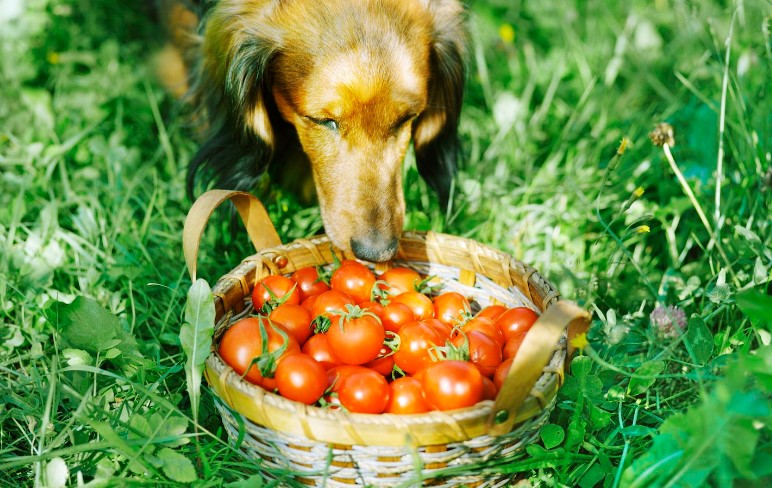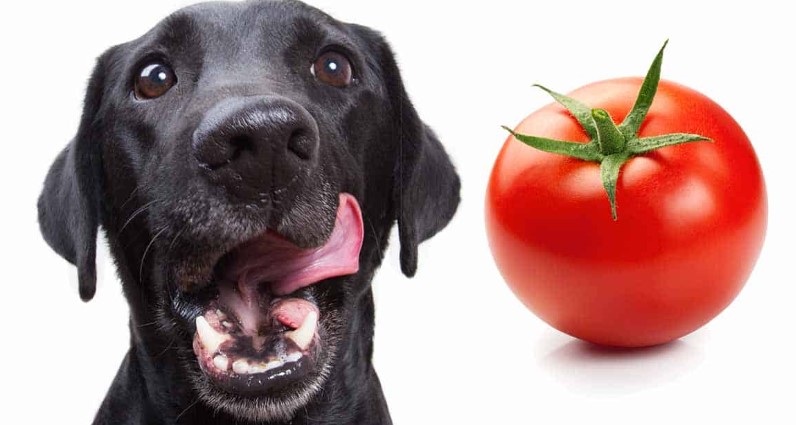You may be wondering if your dog can eat tomatoes. While ripe, uncooked tomatoes are perfectly safe to feed your dog, it’s best to avoid cooking them for your pooch. Cooked tomatoes contain the antioxidant lycopene, which is beneficial for your dog’s health. But if your dog is especially fond of spicy dishes, you should avoid giving it tomatoes at all. If you’re not sure whether to feed your dog with tomatoes, read on to learn more about this food.
Ripe tomatoes are considered nontoxic to dogs, but it’s important to keep them away from your pet’s sensitive stomach if you decide on giving them up for a snack. On the other hand, if you’re planning on making homemade pasta sauce, tomato juice or even salsa, then these types of tomatoes are perfectly safe to feed to your dog who is eating after a long day of playing or walking around the yard.

Unripe tomatoes are safe for dogs
If you’ve ever fed your dog unripe tomatoes, you know that they can be dangerous for your dog. The alkaloid tomatine found in green tomatoes is toxic to dogs, but it metabolizes to a safe substance once the tomatoes have ripened. Additionally, unripe tomatoes contain solanine, which is a glycoalkaloid that has a bitter taste. These compounds can also make tomatoes toxic to dogs, but they’re still generally safe for consumption.
Tomatoes are not poisonous to dogs, but they can be harmful. Toxic to humans, tomatine can be found in the stems, roots, and leaves of the tomato plant. Unripe tomatoes contain the highest concentrations of tomatine, so you should only give your dog a few slices at a time.
However, you can still give your dog the whole plant if you’re sure it’s safe for dogs.
Cooked tomatoes contain anti-oxidant lycopene
While the fruit of the tomato contains high concentrations of the antioxidant Lycopene, it does not contain harmful toxins. Tomatoes are generally safe to feed to dogs when cooked, fermented, or in contact with other parts of the plant. Although no studies have proven lycopene’s safety in dogs, other parts of the plant are dangerous. Hence, it is recommended to cook the tomatoes before serving them to your dog.
Tomatoes are a common vegetable and are consumed by humans for their flavor, but dogs can also benefit from them. Lycopene in tomatoes helps maintain healthy vision. It functions in combination with other nutrients in the body to slow the progression of eyesight problems in older dogs. It also contains vitamin A. Dogs who have low levels of this vitamin may develop night vision problems.

Tomatine is toxic to dogs
Like humans, dogs can become poisoned by tomatine. But unlike humans, their bodies do not react to it in the same way as ours. Ingestion of large amounts of tomato can cause various symptoms, including drowsiness, depression, vomiting, diarrhea, abdominal pain, and confusion. Dogs may also develop an allergy to tomato, resulting in hives, coughing, and trouble breathing.
Unripe tomatoes are particularly dangerous because they contain high levels of solanine. However, as tomatoes ripen, the levels of solanine decrease. As a result, green tomatoes are not suitable for dogs. Gardeners should be extra vigilant when preparing and storing their produce, including tomatoes. Accidental poisoning is one of the leading causes of veterinarian visits. Consider purchasing pet insurance if you can’t afford the treatment.
We agree that if tomatoes are allowed in the kitchen and a dog is allowed in the home, then tomatoes should well be a part of the dog’s diet. His or her poop may not be as clean or even present as it could be, but let’s face it: no one’s perfect. And let’s not pretend that the dog’s keeping his poo contained within the confines of his own living space. Let’s not pretend that it won’t end up all over the couch cushions later on that same day. Let’s not pretend that dogs understand human etiquette when it comes to gross pet behavior. To us, tomatoes really aren’t too much of an issue when they’re left as an occasional treat during off-duty moments. They’re better than any other option, really.

